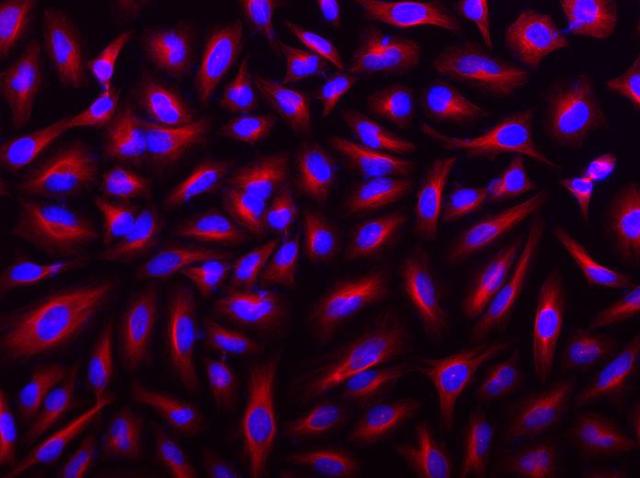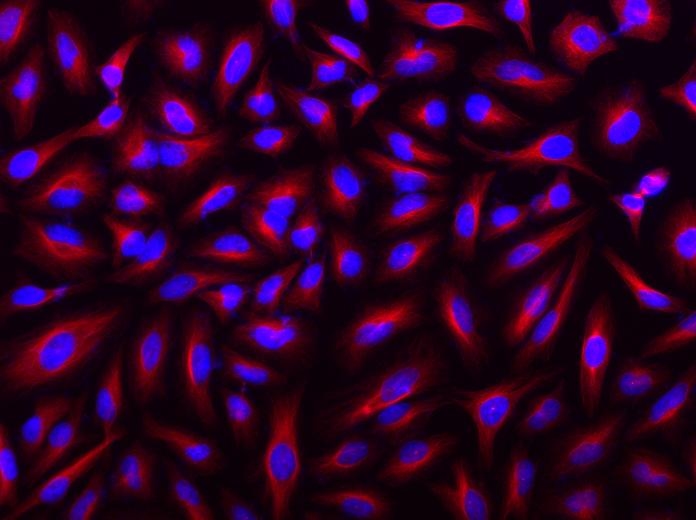Texas Red®-streptavidin conjugate
Streptavidin conjugates are widely used together with a conjugate of biotin for specific detection of a variety of proteins, protein motifs, nucleic acids and other molecules since streptavidin has a very high binding affinity for biotin. This Texas Red-streptavidin conjugate comprises streptavidin (as the biotin-binding protein) with Texas Red covalently attached (as the fluorescent label). Our Texas Red-streptavidin conjugate was prepared using AAT Bioquest's proprietary labeling technology. It demonstrated much brighter signal compared to the similar Texas Red-streptavidin conjugates from other commercial sources, thus can significantly increase assay sensitivities. It is commonly used as a second step reagent for indirect immunofluorescent staining, when used in conjunction with biotinylated primary antibodies. It is a valuable tool for biotin-streptavidin-based biological assays and tests using flow cytometry with a Texas Red filter set. A variety of the complementary biotinylated reagents are available from numerous commercial vendors.
Spectrum
Citations
View all 1 citations: Citation Explorer
Overexpression of MACC1 and the association with hepatocyte growth factor/c-Met in epithelial ovarian cancer
Authors: Li, Hongyu and Zhang, Hui and Zhao, Shujun and Shi, Yun and Yao, Junge and Zhang, Yanyan and Guo, Huanhuan and Liu, Xingsuo
Journal: Oncology letters (2015): 1989--1996
Authors: Li, Hongyu and Zhang, Hui and Zhao, Shujun and Shi, Yun and Yao, Junge and Zhang, Yanyan and Guo, Huanhuan and Liu, Xingsuo
Journal: Oncology letters (2015): 1989--1996
References
View all 47 references: Citation Explorer
A streptavidin paramagnetic-particle based competition assay for the evaluation of the optical selectivity of quadruplex nucleic acid fluorescent probes
Authors: Largy E, Hamon F, Teulade-Fichou MP.
Journal: Methods. (2012)
Authors: Largy E, Hamon F, Teulade-Fichou MP.
Journal: Methods. (2012)
Biotin-4-fluorescein based fluorescence quenching assay for determination of biotin binding capacity of streptavidin conjugated quantum dots
Authors: Mittal R, Bruchez MP.
Journal: Bioconjug Chem (2011): 362
Authors: Mittal R, Bruchez MP.
Journal: Bioconjug Chem (2011): 362
Iminobiotin binding induces large fluorescent enhancements in avidin and streptavidin fluorescent conjugates and exhibits diverging pH-dependent binding affinities
Authors: Raphael MP, Rappole CA, Kurihara LK, Christodoulides JA, Qadri SN, Byers JM.
Journal: J Fluoresc (2011): 647
Authors: Raphael MP, Rappole CA, Kurihara LK, Christodoulides JA, Qadri SN, Byers JM.
Journal: J Fluoresc (2011): 647
Streptavidin-Binding Peptide (SBP)-tagged SMC2 allows single-step affinity fluorescence, blotting or purification of the condensin complex
Authors: Kim JH, Chang TM, Graham AN, Choo KH, Kalitsis P, Hudson DF.
Journal: BMC Biochem (2010): 50
Authors: Kim JH, Chang TM, Graham AN, Choo KH, Kalitsis P, Hudson DF.
Journal: BMC Biochem (2010): 50
Determination of 17beta-oestradiol by fluorescence immunoassay with streptavidin-conjugated quantum dots as label
Authors: Sun M, Du L, Gao S, Bao Y, Wang S.
Journal: Steroids (2010): 400
Authors: Sun M, Du L, Gao S, Bao Y, Wang S.
Journal: Steroids (2010): 400
Page updated on August 29, 2025



